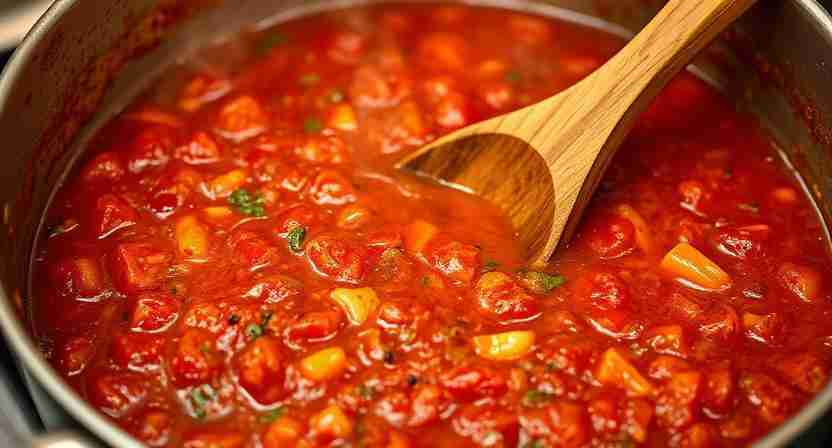Introduction
Spaghetti Sauce is a timeless staple, perfect for cozy pasta nights, family gatherings, or easy meal prep. It’s rich, savory blend of tomatoes, herbs, and ground meat creates a hearty, comforting topping for spaghetti or other pastas. Served in a white ceramic bowl, garnished with fresh basil or parsley, this Spaghetti Sauce offers a vibrant, inviting aesthetic. This recipe delivers a classic spaghetti sauce that is adaptable for dietary preferences and best served hot for a satisfying, Italian-inspired experience.
Ingredients
For the Spaghetti Sauce:
- 1 tbsp olive oil
- 1 lb ground beef (or Italian sausage, or half beef/half sausage)
- 1 medium yellow onion, finely chopped
- 3 cloves garlic, minced
- 1 (28 oz) can crushed tomatoes
- 1 (15 oz) can tomato sauce
- 2 tbsp tomato paste
- 1 tsp dried oregano
- 1 tsp dried basil
- 1/2 tsp dried thyme
- 1/2 tsp red pepper flakes (optional, for heat)
- 1 tsp sugar (optional, to balance acidity)
- 1/2 tsp kosher salt
- 1/4 tsp black pepper
- 1/4 cup red wine (optional, for depth)
For Serving:
- Optional: Chopped fresh basil or parsley
- Suggested Accompaniments: Cooked spaghetti, garlic bread, Caesar salad
- Suggested Pairings: Red wine, iced tea
- Suggested Aesthetic: Serve in a white ceramic bowl
- Suggested Equipment: Large saucepan or Dutch oven, wooden spoon
Step-by-Step Process
- Cook Meat: Heat olive oil in a large saucepan or Dutch oven over medium heat. Add ground beef (or sausage), breaking it up with a wooden spoon, and cook for 5-7 minutes until browned. Drain excess fat, leaving 1 tbsp in the pan.
- Sauté Aromatics: Add onion; cook for 3-4 minutes until softened. Add garlic; cook for 1 minute until fragrant.
- Build Sauce: Stir in crushed tomatoes, tomato sauce, tomato paste, oregano, basil, thyme, red pepper flakes (if using), sugar (if using), salt, and pepper. Add red wine (if using). Bring to a simmer.
- Simmer: Reduce heat to low, cover partially, and simmer for 20-30 minutes, stirring occasionally, until flavors meld and the sauce thickens. Adjust seasoning to taste.
- Serve: Transfer the sauce to a white ceramic bowl. Garnish with fresh basil or parsley. Serve hot overcooked spaghetti with garlic bread, Caesar salad, red wine, or iced tea.
Tips for Better Spaghetti Sauce
- Use a mix of beef and sausage for deeper flavor; lean beef reduces grease.
- Cook onions until soft to avoid crunchiness in the sauce.
- Simmer longer (up to 1 hour) for richer flavor; add water if it thickens too much.
- Taste before serving; adjust salt, sugar, or herbs to balance acidity or flavor.
- Use good-quality canned tomatoes for the best taste; San Marzano is ideal.
- Stir occasionally to prevent sticking or burning on the bottom.
- If the sauce is too acidic, add a pinch more sugar or a small carrot while simmering.
- Enhance aesthetic: Serve in a white ceramic bowl, sprinkle with fresh herbs for a vibrant look.
Variations and Customization
- Vegetarian Spaghetti Sauce: Omit meat, add 1 cup diced mushrooms, and 1 diced zucchini, sautéed with onions.
- Vegan Spaghetti Sauce: Use plant-based meat crumbles or extra veggies, omit wine, or use vegan wine.
- Gluten-Free Spaghetti Sauce: Ensure all ingredients (e.g., tomato paste) are gluten-free; serve with gluten-free pasta.
- Spicy Spaghetti Sauce: Increase red pepper flakes to 1 tsp or add 1/2 tsp cayenne.
- Low-Sodium Spaghetti Sauce: Reduce salt to 1/4 tsp and use low-sodium tomato products.
- Meatless Marinara: Skip meat, reduce simmer time to 15 minutes for a lighter sauce.
- Creamy Spaghetti Sauce: Stir in 1/4 cup heavy cream or 2 tbsp cream cheese at the end.
- Herbed Spaghetti Sauce: Add 1 tbsp fresh rosemary or 2 tbsp fresh parsley to the sauce.
Storage and Serving Tips
- Store leftovers in an airtight container in the fridge for 4 days.
- Reheat in a saucepan over medium heat, stirring, for 5-7 minutes, or microwave for 1-2 minutes, stirring halfway.
- Freeze in an airtight container for 3 months; thaw in the fridge and reheat gently to maintain texture.
- Serve hot for the best flavor; cold sauce may thicken.
- Use leftovers in lasagna, pizza topping, or as a dip for breadsticks.
- Don’t leave at room temperature for over 2 hours.
- Pair with starchy pasta to soak up the sauce’s richness.
- Presented in a white ceramic bowl with fresh herbs for an inviting charm.
Nutritional Information
Based on 6 servings (3/4 cup sauce, without pasta):
- Calories: 220 kcal
- Total Fat: 12g
- Saturated Fat: 4g
- Trans Fat: 0g
- Cholesterol: 45mg
- Sodium: 680mg
- Total Carbohydrates: 14g
- Dietary Fiber: 3g
- Sugars: 8g
- Protein: 14g
- Vitamin A: 15% Daily Value
- Vitamin C: 25% Daily Value
- Calcium: 6% Daily Value
- Iron: 15% Daily Value
Note: Values vary by brand. Moderate in sodium and fat; try vegetarian or low-sodium versions. Serve with veggies for balance.
Conclusion
This Spaghetti Sauce recipe offers a rich, flavorful dish perfect for any pasta night. It transforms simple ingredients into an Italian-inspired classic. Its easy preparation and vibrant presentation make it a favorite. The hearty sauce and fresh garnishes delight every time. It’s sure to be a cherished recipe, loved for its comforting appeal.

Spaghetti Sauce Recipe: Rich and Flavorful
Ingredients
- Spaghetti Sauce:
- 1 tbsp olive oil
- 1 lb ground beef or sausage
- 1 onion chopped
- 3 cloves garlic minced
- 1 28 oz can crushed tomatoes
- 1 15 oz can tomato sauce
- 2 tbsp tomato paste
- 1 tsp oregano
- 1 tsp basil
- ½ tsp thyme
- ½ tsp red pepper flakes optional
- 1 tsp sugar optional
- ½ tsp salt
- ¼ tsp pepper
- ¼ cup red wine optional
- Optional: Basil parsley
- Suggested Pairings: Spaghetti red wine
Instructions
- Heat oil, cook beef for 5-7 minutes until browned; drain excess fat.
- Add onion, cook for 3-4 minutes; add garlic, cook for 1 minute.
- Stir in tomatoes, sauce, paste, herbs, spices, sugar, and wine; simmer for 20-30 minutes.
- Adjust seasoning.
- Garnish with basil; serve over spaghetti with wine.
Notes
- Use quality tomatoes for flavor.
- Store in the fridge for 4 days or freeze for 3 months.
- Try a vegetarian variation.
- Pair with garlic bread.









